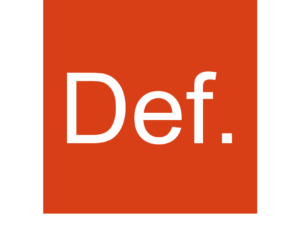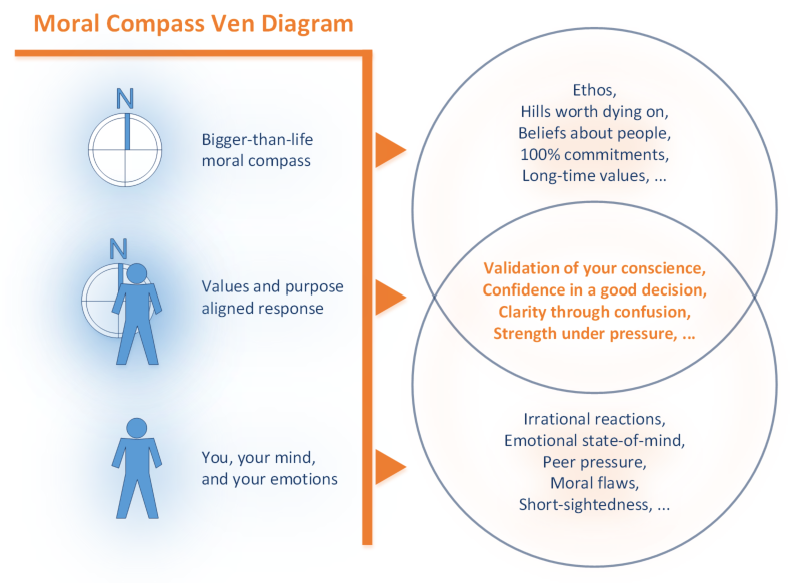
Moral Compass (ethos / tao / way of life)
The spirit of your lifestyle and relationships as expressed through beliefs, choices, and aspirations. A balanced code of behavior that you live by, harmonizing with purpose, validating your conscience, and helping to direct values-driven behavior.
An “outside of self” thing.
Moral compass (defined above) is an analogy I chose for its practicality. We can all imagine standing in the wilderness, holding a compass close, looking for north. Your personal compass may look more like a religion, morality, tradition, family, or a social identity. A moral compass exists “outside-of-self” and is very stable (neither relative to circumstances nor quick to change). When you need something to remind you of the difference between right and wrong, you turn to the compass.
This article posits that the moral compass is a critical component to management decision making. Take a moment to remember your own compass. How would you describe its appearance? What is it called?
A moral compass helps by providing validation to your conscience (your natural sense of right and wrong). When deciding between two alternatives, it works with your conscience to provide a bird’s eye view, which matters especially when your conscience is suppressed by heightened emotions, irrational thoughts, and peer pressure. You compare the facts of two alternatives against this absolute code of behavior – north is always north – the result being that you can see the good alternative and wake up your sense of right and wrong in spite of your mental and emotional state.
Reflect on a scenario.
You are Andrew Fastow, the CFO of Enron. There is an opportunity to sure up your company’s confidence with investors by adopting a new financial scheme. It is not illegal but may be unethical or encourage fraudulent behavior. The work culture at your company is aggressive and your colleagues are both powerful and wealthy. Your CEO and others are titillated by your idea and have encouraged you to follow through.
Without a Moral Compass (Alternative #1)
You are trying to weigh your decision practically and strategically, asking whether the personal and professional risk is worth the possible riches and respect. Rational thought is suppressed by your emotional & mental state (lust for wealth, fear of disapproval, and loss aversion). You are somewhat blind to emotional and long-term risk and feel disparaged by the idea of missing an opportunity. Half-blind to the consequences, you make a rash decision.
“Loss Aversion” is the tendency to prefer avoiding loss over acquiring gains. In this example, you fear missing out on the opportunity more than you value the idea of a wise decision.
With a Moral Compass (Alternative #2)
You are trying to weigh your decision practically and strategically; but this time you have guidance that transcends the situation. You experience emotional & mental influences (lust, fear, and irrational thoughts) and your peers are still pressuring you. Taking the time to reflect, you revisit the ethos that always informs your better decisions. This frees you see the potential for unethical and illegal behavior, and to imagine how destructive and painful it could be. You affirm what your conscience has been telling you – that this opportunity is a mistake with series consequences.
The idea of having a greater-than-yourself source of validation is highly practical. As a decision maker with power you need to have authority over your own decision-making process and a moral compass to stabilize that process. It helps balance the influences of your emotional state, psychological flaws, and social pressures. It is not unlike the architect’s straight edge, facilitating the creation of straight and measured lines. Without it there is nothing stable upon which to rest your pencil. A moral compass can also align with or come from organizational purpose. Purpose is more stable as part of an ethos, and if your employees agree elevates work in the vain of a bigger-then-life effort.
The consequences for not having a moral compass are also clearly practical. Take as examples the white collar crimes perpetrated by Enron and Volkswagen. These events were clearly wrong; but can you ague that given the responsibility these decision makers had with the temptation and encouragement to create success unethically, you would not have done the same? Would you have turned down the promise of success and what it buys? That would be a moral decision, and you would need the clarifying help of a greater-than-yourself perspective to see past the titillation offered by money, power, and recognition.
A few tips for success.
- Take time for self-care. Don’t become a victim of your own ambition by ignoring your emotional, spiritual, and physical needs. If your company needs you, it also needs you healthy.
- Invest in EQ. Emotional intelligence is a very special skill. The capacity to connect with your emotions, values, and moral compass always involved emotional intelligence.
- Surround yourself with shared core values. Building deep relationships with people that share your moral compass is a good way to sure up your stability. Even the best decision makers are not an island.


